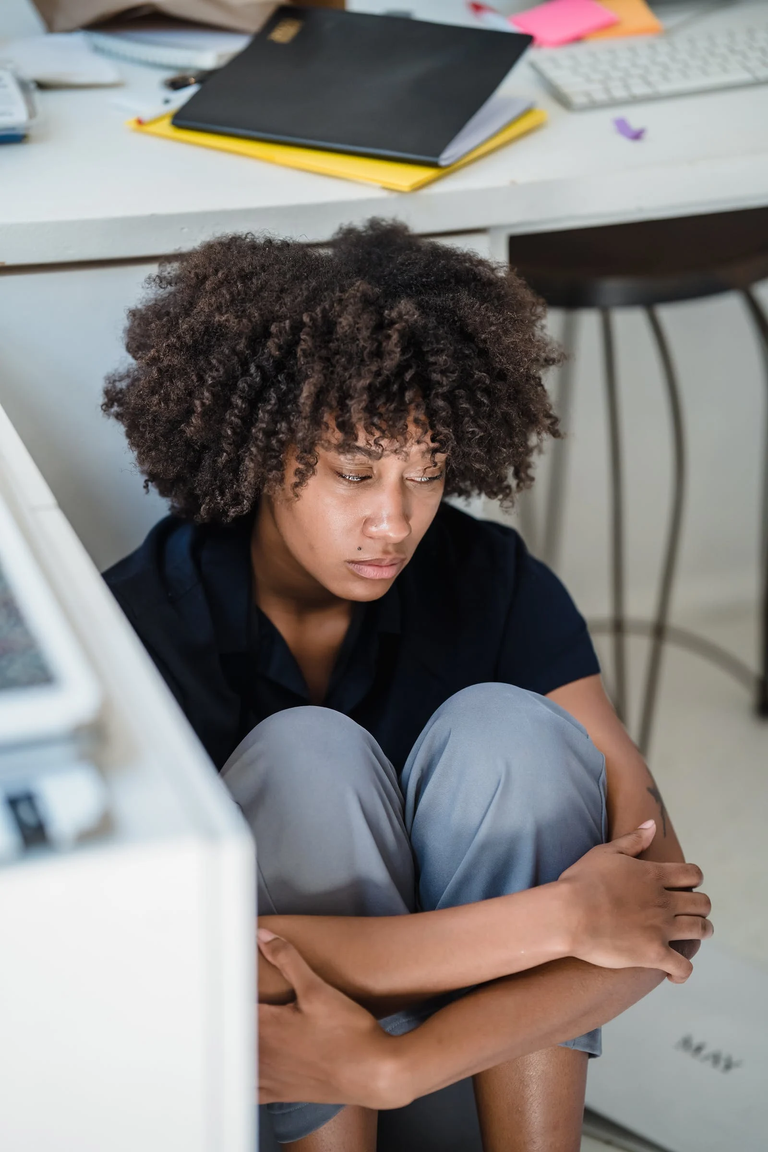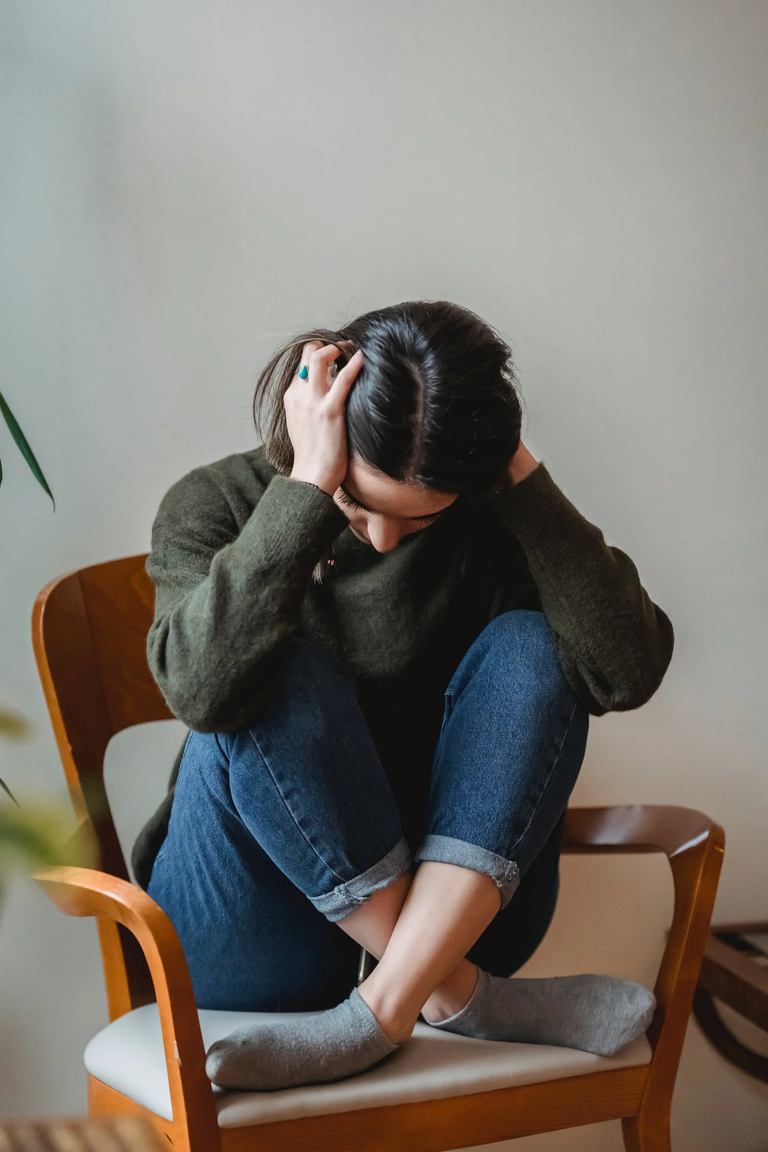The Possibility of Postpartum Depression in Pregnant Women.
As a little girl, I was really emotional (I am still very emotional) and I always love when other people are treated right, there was this man who always brought his wife to the saloon, he would sit with her until she gets her hair done, and he will hold her hand and try to talk to her but through the entire process, the woman would always wear a frown on her face and I was always bothered about what the problem was, I wondered if this woman was not excited about her loving husband.
After I witnessed this on three different occasions, I had to ask my Mum questions about the couple and she explained to me, that the woman suddenly became very sick after she had her twin, and as a result of her illness, she cannot seem to do anything on her own and her husband has to do everything for her, I felt pity for the wife who may no longer be herself and for the husband who now has the entire responsibility of taking care of his wife and kids.
I must confess that after this experience, I became really scared of childbirth, but then, I decided to do my research on the topic, just to be sure that it is okay to be a woman who wants to birth her own kids (smiles).

pexels
Ever heard of Postpartum Depression?
Postpartum depression is a complex situation, it involves emotional, physical, and behavioral changes that happen in women after they give birth. It is a rapid drop in hormonal conditions after delivery.
Usually, the levels of progesterone and estrogen increase greatly like over tenfold when a woman is pregnant, the hormones then drop sharply 3 days afterward to what they used to be before pregnancy. The chemical changes in the body, as well as psychological and social factors, contribute greatly to the chances of developing depression.1
PPD can actually happen just a few days or a few months after childbirth, and it does not necessarily occur after the birth of the first child. The feeling could actually be similar to that of baby blues, it's just that the feeling of sadness, anxiety, crankiness, and despair is felt more strongly in this case.
Unlike baby blues, Postpartum depression actually stops you from going around your daily activities. PPD can be treated with counseling and appropriate medication, but if it is left untreated it could grow into something even stronger.
Some women experience baby blues after childbirth, which is a minor mood change after childbirth, it usually lasts for just a few days, but the case is different for Postpartum depression or Postpartum Psychosis.
Postpartum depression usually has these symptoms;
- Troubled sleep.
- Low libido.
- Extreme fatigue.
- Change in appetite.
- Regular mood change.
- Constantly crying, even without a specific reason.
- Absence of pleasure.
- Feeling helpless, worthless, and hopeless.
- Thoughts of hurting the baby or someone else.
- Thoughts of suicide and death.

pexels
There are factors that can increase the chances of having Postpartum depression, research has shown that things can be different for people depending on societal and psychological contributions.
Birthing a child with special needs or health issues could make the mother fall into depression.
A family with previous mood disorders could create possible chances of having depression.
The birth of twins or triplets.
Occurrence of stressful happenings prior to childbirth.
Age could also be a related factor (pregnancy in children/young adolescents).
Marital issues.
Complications during childbirth.
Death/demise of partner or loved one.
Living alone could also contribute to postpartum depression.1
There are levels to the type of depression felt by a woman after childbirth, according to the level of depression, there are two other different other terms to describe Postpartum depression when it happens.
Baby blues happens to as much as 70% category of women. It is the sudden mood change that occurs right after childbirth. Some women may suddenly begin to feel really sad after childbirth, others may get really cranky, restless, lonely, sad, and even anxious. The condition usually begins immediately after delivery and last four a few minutes, hours, or even days, but it naturally subsides within weeks even without any form of treatment. Speaking with other Mums actually makes things easier.
** Postpartum psychosis**: This is the most serious postpartum condition that exists, it is a severe mental illness, that is characterized by extreme difficulty when it comes to responding emotionally to a newborn. Some cases of postpartum psychosis could be so complicated that the mother of the child would harbor thoughts of harming her own child.
It is possible for a woman to experience both postpartum depression and postpartum psychosis together. This condition is really rare because if it was common, I am sure most women would rather not just have their babies.
The main cause of postpartum psychosis is unknown, but 50% of the cases women who have this condition usually have past experienced cases of mental conditions, sometimes it doesn't even happen instantly, it could begin to showcase after three months of delivery.

pexels
Sometimes the symptom comes suddenly and if no one is there to control them at the time, they may do something disastrous either to themselves or to the baby. The earlier the signs are discovered, the better the condition will be controlled, these are some of the signs to watch out for;
- High case of delusions.
- Lack of emotional connection with the baby.
- Feeling confused and irritated.
- Thoughts of suicide, or feeling that the family would do better without her.
- Inability to properly bond with the baby.
- Change in appetite.
- Making irrational statements.
Most women, especially African women do not like to accept the fact that, they have any condition like this, they would usually ignore the feeling completely. Based on the fact that w a lot of women will be judged if they try to speak up based on their feelings, they simply keep the feelings locked in until something terrible happens.
Meanwhile, early detection of postpartum psychosis can be treated with;
Hospitalization.
Electroconvulsive therapy (ECT): This is usually a recommendation when other treatments have failed, or when life situations appear life-threatening.
Counseling with experts and the intake of medications like antidepressants and antipsychotic medications. 2,3
The best thing that can happen to a woman with postpartum depression is to have a supportive partner, supportive partners have a strong role to play in helping their partners recover. You can help your partner by;
Listening to them when they want to have a conversation.
Taking time to help them with chores and cooking.
Allow them to rest appropriately.
Help them with shopping.
Spend quality time with them.
Stay away from getting lots of visitors.
Keep the home as quiet as possible.3
Can we prevent it?
If there is a former case of depression, it would be wise to open up to your doctor about it.
Become cautious of yourself as a pregnant woman and constantly speak up about your feelings, this would help you find support groups and therapies that would make you feel better.
If the signs are detected early enough, a medical expert could recommend an early postpartum checkup in order to unveil possible symptoms of depression and treatment would begin immediately after childbirth.
Do not isolate yourself, mix with friends and family.
Be open-minded for good things to happen. 1
Conclusion.
The process of birthing another human could really get complex, a lot could happen in the process, and postpartum depression is one of these things. The stage of pregnancy is an extremely delicate one, a pregnant woman should recognize early symptoms of possible depression and speak to an expert as soon as possible.
For further studies.
https://www.webmd.com/depression/guide/postpartum-depression
https://www.everydayhealth.com/postpartum-psychosis/guide/
https://www.nhs.uk/mental-health/conditions/post-partum-psychosis/

Hi, I am Tobi a writer, speaker, relationship blogger, and lover of good music. I love making friends and learning from people. Want to hear me speak on relationships and general life issues, you can find my podcast channel Here and I also have a youtube channel where you can listen and watch any episode for free, do not forget to subscribe and share with friends. I sincerely appreciate every love I get from members of the community and do well to keep them coming.
I'm in the medical field and have witnessed post partum psychosis.
It was a sad experience. Luckily for her too, she had the support of her family.
It is so good to know that she had the support of her family, that is always the best thing that could happen to anyone with postpartum psychosis.
Pregnancy has its own effects...the strong survive.
My brother, no be small matter ooo
I've heard of this situation. Since I'm not a woman nor a medical doctor or a professional related to healthcare, it's difficult to me to understand it. But I know what sadness is. I hope this won't stop you from your plans.
It certainly would not, it is a very rare condition.
Thanks for your contribution to the STEMsocial community. Feel free to join us on discord to get to know the rest of us!
Please consider delegating to the @stemsocial account (85% of the curation rewards are returned).
Thanks for including @stemsocial as a beneficiary, which gives you stronger support.
Your content has been voted as a part of Encouragement program. Keep up the good work!
Use Ecency daily to boost your growth on platform!
Support Ecency
Vote for new Proposal
Delegate HP and earn more